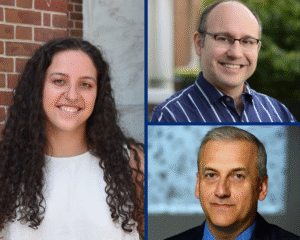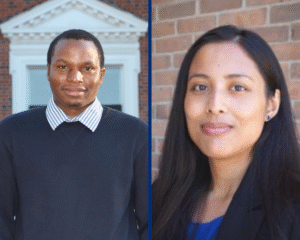The Ralph O’Connor Sustainable Energy Institute can announce Hadas Elazar-Mittelman and Mujaheed Nuhu as the selections for the inaugural year of the ROSEI PhD Fellows Program.
The program will support two PhD stipends for the current academic year. The aim of the program is to:
- Provide an enhanced PhD experience for energy fellows
- Increase the potential that PhD students associated with ROSEI have impactful careers in energy – particularly in work that is timely for the energy transition (including all forms of commercial and non-commercial translation)
- Connect and strengthen ROSEI objectives / pillars / identified needs
- Increase connectivity to ROSEI itself for faculty
“We had a lot of faculty nominations come in, which is a reflection of how many superb PhD students we have studying sustainable energy at Hopkins,” said Susanna Thon, ROSEI’s associate director. “The two recipients are excellent students doing exciting research that naturally aligns with ROSEI’s pillars. I’m excited to see where their research takes them this year.”

Hadas Elazar-Mittelman (L); Jonah Erlebacher (R-Top); Michael Tsapatsis (R-Bottom)
Elazar-Mittelman is co-advised by Jonah Erlebacher, a professor of materials science and engineering and a ROSEI core faculty member and Michael Tsapatsis, the Bloomberg Distinguished Professor of Nanomaterials, a professor of chemical and biomolecular engineering and an associate faculty member of ROSEI.
“We are confident on the impact Hadas will have during this fellowship based on her proven record as a collaborative team player and a strong, creative researcher,” said Erlebacher and Tsapatsis in joint statement.
Her research focuses on carbon-negative technologies for construction and infrastructure, focusing on chemical methods to turn carbon dioxide into stable solids rather than fuels. Elazar-Mittelman utilizes magnesiothermic reduction, a highly exothermic process that uses magnesium to chemically convert CO2 to elemental carbon, first in context of fabricating carbon composites and now applying the approach to make cement manufacturing potentially net-negative in emissions.
“It is an honor to be selected as a recipient of the ROSEI PhD Fellowship. I’ve been involved with ROSEI since the beginning of my PhD and am overjoyed to see how much the institute has grown and expanded over the years,” Elazar-Mittelman said. “This fellowship will give me the chance to take on greater leadership roles within the ROSEI community and advance its mission through my research on sustainable manufacturing of infrastructure materials. I am especially grateful to my advisors for their guidance and support throughout my academic journey and in nominating me for this opportunity.”

Mujaheed Nuhu (L); Shilva Shrestha (R)
Nuhu was nominated for the program by Shilva Shrestha, a ROSEI associate faculty member and assistant professor of environmental health and engineering. In her nomination letter, Shrestha noted that Nuhu’s “leadership, collaborative nature, and problem-solving abilities have been an asset to my newly established lab and our department’s academic community. I am confident he will bring a similar contribution to the ROSEI community and be a valuable asset to the program.”
Nuhu’s research looks to develop versatile and innovative biotechnologies for converting dairy, food, and agricultural waste into high-value products such as medium chain carboxylic acids and medium chain fatty alcohols, which are critical precursors for aviation fuels and biopolymers. The work directly addresses critical barriers in waste valorization biotechnologies, such as low yields, competitive side reactions, and process inefficiencies that currently limit the scalability of waste-based biotechnologies to produce value-added products
“I am honored to be part of ROSEI’s inaugural PhD Fellows,” Nuhu said. “I look forward to collaborating across ROSEI to advance scalable technologies that brings my work from the lab into real-world biomanufacturing solutions.”
